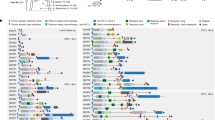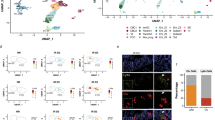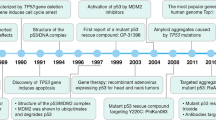Abstract
Inactivation of wild-type p53 tumor suppressor function is the primary mechanism of tumor initiation in Li–Fraumeni syndrome (LFS) individuals with germline p53 mutations. Tumors derived from LFS patients frequently retain the normal p53 allele, suggesting that alternative mechanisms in addition to gene deletion must be involved in inactivating wild-type p53 protein. DNA tumor viruses, such as SV40, target p53 for inactivation through the action of viral oncoproteins. We studied the probands from two unrelated LFS families, each of whom presented with multiple malignant neoplasms. Patient 1 developed an embryonal rhabdomyosarcoma (RMS) and a choroid plexus carcinoma (CPC), while patient 2 developed a CPC and subsequently presented with both an osteosarcoma (OS) and renal cell carcinoma (RCC). We utilized DNA sequence analysis and immunohistochemistry to determine p53 gene status in the germline and tumors, as well as evidence for SV40 T-antigen oncoprotein expression. Each patient harbored a heterozygous germline p53 mutation at codons 175 and 273, respectively. In patient 1, the normal p53 gene was lost while the mutant p53 allele was reduced to homozygosity in the RMS. Both normal and mutant genes were maintained in the CPC. In patient 2, normal and mutant p53 alleles were retained in both the CPC and RCC. Both specific PCR and immunostaining detected SV40 T-antigen in both CPCs and the RCC. In addition to chromosomal alterations, epigenetic mechanisms may disrupt p53 function during tumorigenesis. In two LFS patients, we found SV40 DNA sequences and viral T-antigen expression that could account for inactivation of the normal p53 protein. Inactivation of p53 or other tumor suppressors by viral proteins may contribute to tumor formation in specific tissues of genetically susceptible individuals.
This is a preview of subscription content, access via your institution
Access options
Subscribe to this journal
Receive 50 print issues and online access
$259.00 per year
only $5.18 per issue
Buy this article
- Purchase on Springer Link
- Instant access to full article PDF
Prices may be subject to local taxes which are calculated during checkout





Similar content being viewed by others
References
Bergsagel DJ, Finegold MJ, Butel JS, Kupsky WJ, Garcea RL . 1992 N. Engl. J. Med. 32: 988–993
Brinster RL, Chen HY, Messing A . 1984 Cell 37: 367–377
Brugieres L, Gardes M, Moutou C, Chompret A, Meresse V . 1993 Cancer Res. 53: 452–455
Butel JS, Lednicky JA . 1999 J. Natl. Cancer Inst. 91: 119–134
Carbone M, Rizzo P, Pass HI . 1997 Oncogene 15: 1877–1888
Carbone M, Rizzo P, Procopio A, Giuliano M, Pass HI, Gebhardt MC, Mangham C, Hansen M, Malkin D, Bushart G, Pompetti F, Picci P, Levine A, Bergsagel JD, Garcea RL . 1996 Oncogene 13: 527–535
Carpenter DB, Michelsen WG, Hays AP . 1986 J. Neurosurg. 56: 722–727
Chen J, Tobin GJ, Pipas JM, Van Dyke T . 1992 Oncogene 7: 1167–1173
Crawford L, Leppard K, Lane D, Harlow E . 1982 J. Virol. 42: 612–620
Diller L, Sexsmith E, Gottlieb A, Li FP, Malkin D . 1995 J. Clin. Invest. 95: 1606–1611
Dobbelstein M, Roth J . 1998 J. Gen. Virol. 79: 3079–3085
Ewald D, Li M, Efrat S, Auer G, Wall RJ, Furth PA, Henninghausen L . 1996 Science 273: 1384–1386
Flaegstad T, Andresen PA, Johnsen JI, Asomani SK, Jorgensen GE, Vignarajan S, Kjuul A, Kogner P, Traavik T . 1999 Cancer Res. 59: 1160–1163
Frebourg T, Barbier N, Yan Y-X, Garber JE, Dreyfus M, Fraumeni JF, Li FP, Friend SH . 1995 Am. J. Hum. Genet. 56: 608–615
Jolly KW, Malkin D, Douglass EC, Brown TF, Sinclair AE, Look AT . 1994 Oncogene 9: 97–102
Kleihues P, Schauble B, Hausen AZ, Esteve J, Ohgaki H . 1997 Am. J. Pathol. 150: 1–13
Kramer S, Meadows AT, Jarrett P, Evans AE . 1983 J. Natl. Cancer Inst. 70: 49–55
Krynska B, Del Valle L, Croul S, Gordon J, Katsetos CD, Carbone M, Giordano A, Khalili K . 1999 Proc. Natl. Acad. Sci. USA 96: 11519–11524
Li FP, Fraumeni Jr JF, Mulvihill JJ, Blattner WA, Dreyfus MG, Tucker MA, Miller RW . 1988 Cancer Res. 48: 5358–5362
Lichtenstein P, Niels VH, Verkasalo PK, Iliadou A, Kaprio J, Koskenvuo M, Pukkala E, Skytthe A, Hemminki K . 2000 New Engl. J. Med. 343: 78–85
Malkin D . 1998 The Li-Fraumeni Syndrome. The Genetic Basis of Human Cancer 1st edition. Vogelstein B and Kinzler KW. (eds) New York: McGraw-Hill, Inc pp. 393–408
Malkin D, Li FP, Strong LC, Fraumeni Jr JF, Nelson CE, Kim DH, Kassel J, Gryka MA, Bischoff FZ, Tainsky MA, Friend SH . 1990 Science 250: 1233–1238
Mashiyama S, Murakami Y, Yoshimoto T, Sekiya T, Hagiwara K . 1991 Oncogene 6: 1313–1318
McIntyre JF, Smith-Sorensen B, Friend SH, Kassel J, Borresen A-L, Yan YX, Russo C, Sato J, Barbier N, Miser J, Malkin D, Gebhardt MC . 1994 J. Clin. Oncol. 12: 925–930
Mendoza SM, Konishi T, Miller CW . 1998 Oncogene 17: 2457–2462
Miller CW, Aslo A, Won A, Tan M, Lampkin B, Koeffler HP . 1996 J. Cancer Res. Clin. Oncol. 122: 559–565
Peng H-Q, Hogg D, Malkin D, Gallie BL, Bulbul M, Jewett M, Buchanan J, Goss PE . 1993 Cancer Res. 53: 3574–3578
Packer RJ, Perilongo G, Johnson D et al . 1992 Cancer 69: 580–585
Sedlacek Z, Kodet R, Seemanova E, Vodvarka P, Wilgenbus P, Mares J, Poustka A, Goetz P . 1998 Br. J. Cancer 77: 1034–1039
Srivastava S, Zou Z, Pirollo K, Blattner W, Chang EH . 1990 Nature 348: 747–749
Van Dyke TA, Finlay C, Miller D . 1987 J. Virol. 61: 2029–2032
Varley JM, Birch JM . 1997 Br. J. Cancer 76: 1–14
Varley JM, McGown G, Thorncroft M, Santibanez-Koref MF, Kelsey AM, Tricker KJ, Evans DGR, Birch JM . 1997 Cancer Res. 57: 3245–3249
Varley JM, Thorncroft M, McGown G, Appleby J, Kelsey AM, Tricker KJ, Evans DG, Birch JM . 1997 Oncogene 14: 865–871
Venkatachalam S, Shi YP, Jones SN, Vogel H, Bradley A, Pinkel D, Donehower LA . 1998 EMBO J. 17: 4657–4667
Yuasa H, Tokito S, Tokunaga M . 1993 Neurosurgurgy 32: 131–133
Acknowledgements
We thank L Becker and H Yeger for assistance in interpretation of pathologic analysis, and T Van Dyke for providing the PAb419. This work was supported by grants from the National Cancer Institute of Canada with funds of the Terry Fox Foundation, the Grant Miller Research Fund, University of Toronto, and the Pediatric Oncology Group of Ontario. D Malkin is a Research Scientist of the National Cancer Institute of Canada supported by the Canadian Cancer Society.
Author information
Authors and Affiliations
Corresponding author
Rights and permissions
About this article
Cite this article
Malkin, D., Chilton-MacNeill, S., Meister, L. et al. Tissue-specific expression of SV40 in tumors associated with the Li–Fraumeni syndrome. Oncogene 20, 4441–4449 (2001). https://doi.org/10.1038/sj.onc.1204583
Received:
Revised:
Accepted:
Published:
Issue Date:
DOI: https://doi.org/10.1038/sj.onc.1204583
Keywords
This article is cited by
-
Immunodetection of SV40 T/t-antigens in Human Osteosrcoma in a Series of Tunisian Patients
Pathology & Oncology Research (2012)
-
Histone acetylation resulting in resistance to methotrexate in choroid plexus cells
Journal of Neuro-Oncology (2009)
-
Characterization and application of polyclonal antibodies that specifically recognize JC virus large T antigen
Acta Neuropathologica (2006)
-
SV40 in human brain cancers and non-Hodgkin's lymphoma
Oncogene (2003)
-
Simian virus 40 and its association with human lymphomas
Current Oncology Reports (2003)



